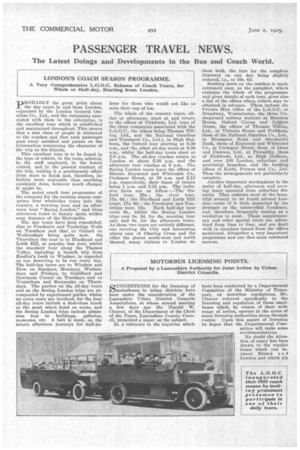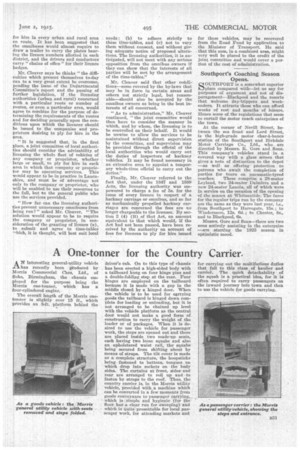MOTORBUS LICENSING POINTS.
Page 14

Page 15

If you've noticed an error in this article please click here to report it so we can fix it.
A Proposal by a Lancashire Authority for Joint Action by Urban District COuncils.
SUGGESTIONS for the licensing of motorbuses in urban districts bate been under the consideration of the Lancashire Urban District Councils Associations, at whose annual meeting a few days ago Mr.' Harold W. Cleaver, of the Department of the Clerk of the Peace, Lancashire County Council, presented a paper on the subject.
In a reference to the inquiries which
have been conducted by a Departmental Committee of the Ministry of Transport, on motorbus regulations, Mr. Cleaver referred specifically to the licensing and regulation of those omnibuses which, by reason of their wide range of action, operate in the areas of many licensing authorities along through routes. Upon this aspect of licensing he hopes that the Departmental Committee will make some recommendations.
No doubt the attention of many has been drawn to the regular buses which 'run between Bristol a n d London and which ply for hire in every urban and rural area en route. It has been suggested that the omnibuses would almost require to draw a trailer to carry the plates bearing the licence numbers allotted in each district, and the drivers and conductors carry "chains of office" for their licence badges.
Mr. Cleaver says he thinks "the difficulties which present themselves to-day can to a very great extent be overcome, pending the issue of the DePartmental Committee's report and the passing of further legislation, if the licensing authorities (urban and rural) concerned with a particular route or number of routes, or even a particular area, would agree to combine for the purpose of determining the requirements of the routes and for deciding generally upon the conditions upon which the licences should be issued to the companies and proprietors desiring to ply for hire in the area.
"It is suggested that, in the first place, a joint committee of local authorities should consider the advisability of licensing the whole fleet of vehicles of any company or proprietor, whether large or small, to ply for hire in each area in which that company or proprietor may be operating services. This wo'uld appear to be in practice in Lancashire, and must be of advantage not only to the company or proprietor, who will be enabled to use their resources to the full, but to the general public who use the services provided.
"How far can the licensing authorities prevent unnecessary omnibuses from being run?" asked Mr. Cleaver. "The solution would appear to be to require the company or proprietor, in consideration of the granting of licence (a), to submit and agree to time-tables —hick it is thought, will best suit local
needs; .(b) to adhere strictly to these time-tables, and (c) not to vary them without consent, and without giving adequate notice of proposed alterations. The licensing authorities, it is anticipated, will not meet with any serious opposition from the omnibus owners if they can show that the interests of all parties will be met by the arrangement of the time-tables."
Mr. Cleaver said that other conditions—some covered by the by-laws that may be in force in certain areas and others not strictly legal, but reasonable—should also be accepted by the omnibus owners as being in the best interests of all concerned.
"As to administration," Mr. Cleaver continued, "the joint committee would then have to consider the manner in which, and by whom, the licensing is to he controlled on their behalf. It would be unwise to allow the services to be maintained without direct supervision by the committee, and supervision may be provided through the official of the local authorities who would carry out the duties of inspectors of hackney vehicles. It may be found necessary in an extensive area to appoint a temporary whole-time official to carry out the duties."
Finally, Mr. Cleaver referred to the fact that, under the 1847 and 1889 Acts, the licensing authority was empowered to charge a fee of 5s. for the issue of every licence in respect of a hackney carriage or omnibus, and so far as mechanically propelled hackney carriages are concerned the fees are no longer chargeable to the licensee. By section 3 (4) (B) ,a that Act, an amount equivalent to that which would, if the Act had not been passed, have been received by the authority on account of fees for licences to ply for hire issued
for these vehicles, may be recovered from the Road Fund by application to the Minister of Transport He said that this sum, in a combined area, might very well be placed to the credit of the joint committee and would cover a portion of the cost of administration.
Southport's Coaching Season Opens.
SOUTHPORT is a somewhat superior place compared with—let us say for purposes of argument and not of disparagement—Blackpool and the resorts that welcome day-trippers and weekenders. It attracts those who can afford weeks of rest and months of leisure. Hence some of•the regulations that seem to curtail the motor coach enterprises of the town.
At the corner of Nevill Street, between the sea front and Lord Street, is the high-grade motor char-à-banes station of the Southport and Birkdale Motor Carriage Co., Ltd., who are directed by Messrs. R. Gore and Sons. This company's vehicles stand in a covered way with a glass screen that gives a note of distinction to the depot —as well as offering protection to patrons who await the completion of parties for tours on pneumatic-tyred coaches. These comprise a 28-seater Leyland, two '24-seater Daimlers and a new 24-seater Lancia, all of which were in service on the occasion of the opening of the season at Whitsuntide. The fares for the regular trips run by the company are the same as they were last year, i.e., from Southport to Harrogate, 15s.; to Windermere, 12s. 6d.; to Chester, 8s., and to Blackpool, 6s.
Messrs. Gore and Sons—there are two sons actively assisting in the enterprise —are starting the 1925 season in optimistic mood.




























